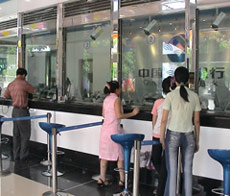
Urban Chinese residents' willingness to spend was down in the third quarter but, paradoxically, retail sales showed robust growth last month.
According to the third-quarter nationwide survey of urban depositors by the central bank, more residents prefer putting their money away in banks than increase consumption.
The survey of 20,000 residents of China's main 50 cities conducted by the People's Bank of China found that only 29.8 per cent want to spend more in the third quarter.
The figure fell 0.8 percentage point compared with the second quarter and decreased 2.5 percentage points compared with the same period a year ago.
However, retail sales, an important indicator of consumption demand, rose a strong 12.5 per cent year-on-year in August to 504.1 billion yuan (US$62.2 billion), according to the National Bureau of Statistics.
Qi Jingmei, a senior economist with the State Information Centre, said the two sets of figures were not contradictory.
"People usually save money to spend on big-ticket items such as cars and houses," she said. "More savings for the future means less consumption at the moment."
The central bank's survey suggests that 37.9 per cent of the residents prefer to save more money in banks, an increase of 1.6 percentage points from the second quarter and 4.5 percentage points from the same period a year ago.
Chinese residents' keenness to buy private homes continued to be low, although their willingness to own homes picked up slightly.
The survey suggests that 19.6 per cent of urban residents plan to buy private homes in the coming three months - an increase of 0.5 percentage point compared with the second quarter.
The government's macro-control measures including higher interest rates for mortgage loans and levying business tax on homes resold within two years continued to have a great impact on residents' consumption behavior, Qi said.
"A majority of people have taken a wait-and-see attitude and expect home prices to decline," she said.
But in the long term, residents will increase spending on homes, because they want to live better lives, said Wang Zhao, a senior researcher with the State Council Development Research Centre.
Increased spending on homes and other items backed by rising incomes would, in turn, fuel growth of retail sales, he said.
"This is what the government wants to see, because it wants to boost consumption to reduce the economy's reliance on investment and exports," he said.
Consumer spending makes up 42 per cent of the national economy compared with 70 per cent in the United States.
The Ministry of Commerce said last month that the country's retail sales are expected to rise 12.7 per cent this year, following last year's 13.3 per cent.
(China Daily September 14, 2005)
|

